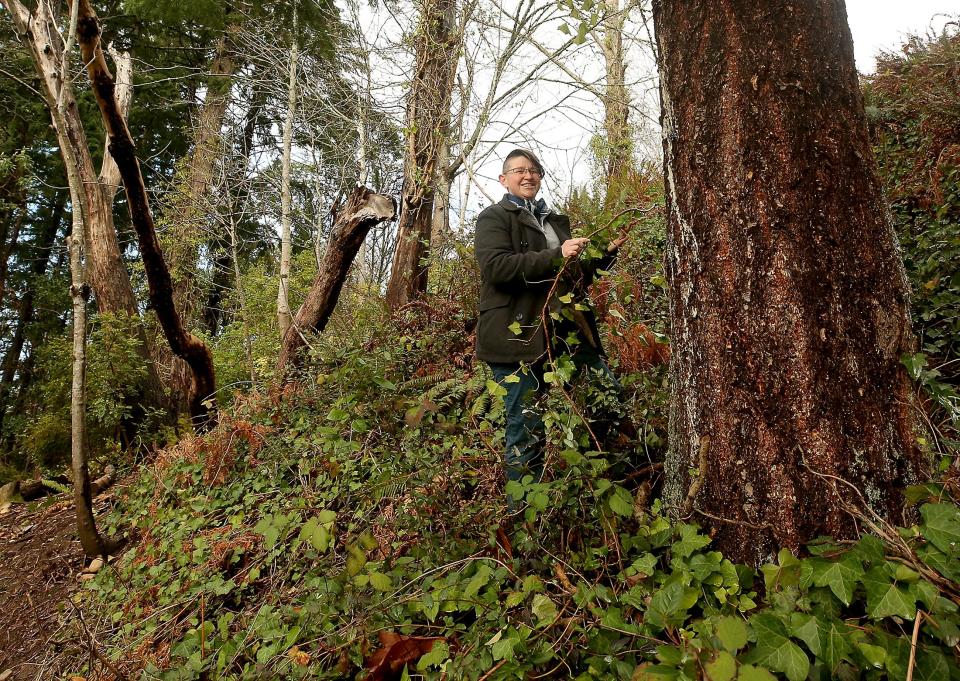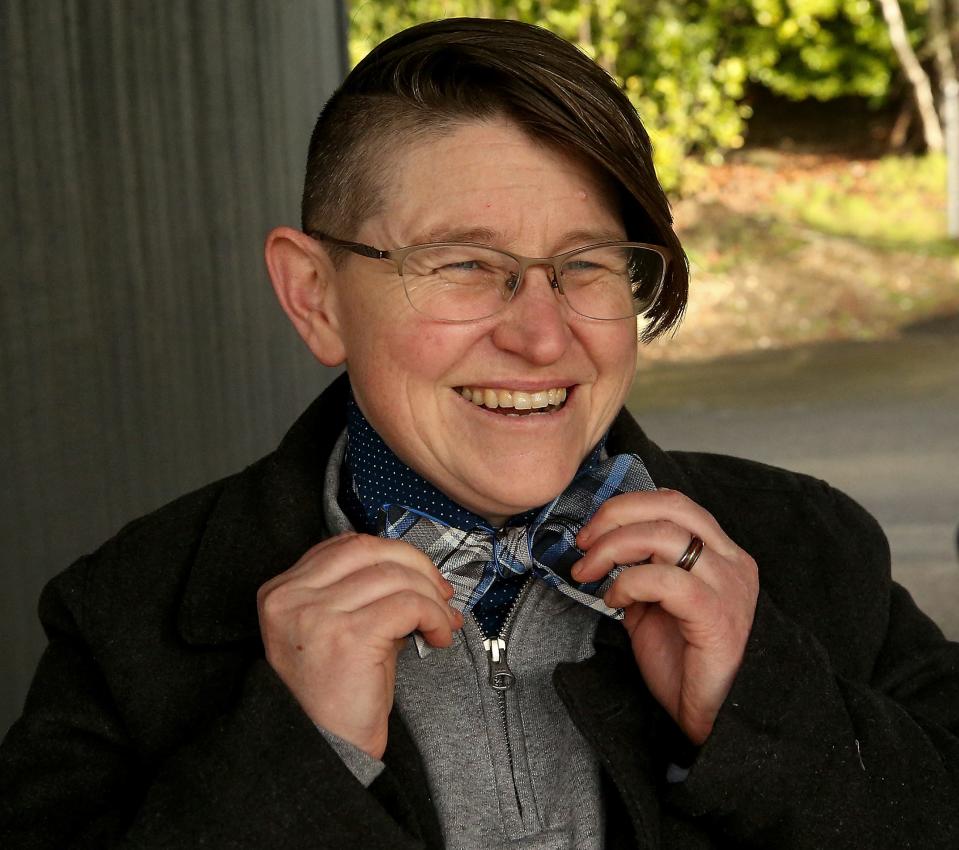Dana Coggon, Kitsap County's 'weed czar,' departs for new job
BREMERTON — Dana Coggon can't leave a forest without making it a little healthier than when she found it. The 43-year-old often corrals a lengthy vine of English ivy like a rancher coiling a rope. She rips from the ground this singular scourge of woodlands, eliminating at least one set of seeds from wreaking havoc on the natural environment.
"One a day keeps a million away," she likes to say.
For more than 15 years, Coggon's been a one-person army in charge of the county's noxious weed program — the "weed czar" as some call her — rooting out invasive plantlife wherever it may lurk. But on Monday, she left for a job as director of the Pierce County Conservation District. Coggon leaves a prolific mark in the fight to push back against invasive plant species in Kitsap County.

"She’s just one of those people who gets things done," said Deb Rudnick, chair of the Bainbridge Island Watershed Council, part of the Sustainable Bainbridge organization. "She’s no-nonsense and practical. And she's a delightful human."
Rudnick worked with Coggon on multiple eradication efforts, including comprehensive strategies to battle knotweed. The invasive plant's spread included streams, where even salmon were threatened. Its removal must be handled delicately, as trimming, mowing or digging at its roots just makes it grow faster.
"Now you’re hard-pressed to find any on the island," Rudnick said.
Coggon's new job is a much bigger operation. The staff of up to a dozen seasonal employees in Kitsap isn't near the size of the 30 full-time employees she'll lead. The work will be more holistic, too.
"I spent a lot of years focusing on getting rid of things, so others could plant," she said. "Now, I'll get to do some of the planting, too."
Coggon's future commute is shorter. She'll be closer to her home in Tacoma, where she lives with her partner, Kristin Ang, and her 14-year-old dog, Grace.
'A pandemic on our lands'
Efforts to eradicate weeds in Washington actually predate statehood. Canada thistle, a prickly weed brought by settlers, was outlawed in 1881.
"Farmers knew if invasive species took off, they'd become a pandemic on our lands," Coggon said. The destruction of the environment happens slowly but surely. "All it takes is one bird, and one berry, transporting a seed to where English ivy begins to crowd out native plants, and climb conifers," she said. "The added weight brings down the tree, and the ivy moves on to its next victim."

Invasive species removal isn't just important for the environment: a 2021 study estimates invasive species cause destruction and require an eradication effort amounting to a whopping $26 billion a year in North America alone, according to the U.S. Department of Agriculture.
Kitsap County, meanwhile, dragged its feet in forming a noxious weed board, one of the last three counties in the state to create one in 1999.
Coggon helped the county declare war on plants like giant hogweed, purple loosestrife, Dalmatian toadflax and spotted knapweed. She repelled down hillsides and subjected herself to burns, visible scars she carries with her today. In some cases, her work is critical to human life — the philosopher Socrates was killed by ingesting poison hemlock, which grows here — as well as the well-being of native plants.
A native of Molalla, Oregon, a quiet town in the Willamette Valley, Coggon studied at Colorado State University before taking a job with the Washington State Department of Agriculture. She'd planned to be a wildlife biologist but began to notice that hoofed mammals like deer and elk avoid grazing in areas where native vegetation is under threat from invasives. That fascinated her enough to change her career path. She got the job here in 2005.
Coggon has been a recognizable figure, all the more in recent years by her colorful collection of more than 200 bow ties. She said she once visited the mother of a friend at the hospital and wore one for the first time to provide levity in a tough situation. They became a signature for her, at a minimum wearing one every Tuesday — or "Ties Day," as she calls it.
"It just seems to put a smile on peoples' faces," she said.
All the while, Coggon has faced challenges for funding. Success in her world means "out of sight, out of mind," and her budget relies on a $2 per parcel fee landowners pay per year.
"She did so much with so little funding," said Deborah McDaniel, a gardener who has known Coggon for her entire career here. "She's such a positive ray of sunshine with an encyclopedic knowledge of her field."
Kitsap County has yet to hire her replacement in the job, she said, but she said she's confident county leaders, including the noxious weed board, will fill the role and continue the unending work.
"The county is in good hands," Coggon said.
Josh Farley is a reporter covering the military and Bremerton for the Kitsap Sun. He can be reached at 360-792-9227, josh.farley@kitsapsun.com or on Twitter at @joshfarley.
This article originally appeared on Kitsap Sun: Dana Coggon, Kitsap County's 'weed czar,' departs for new job

